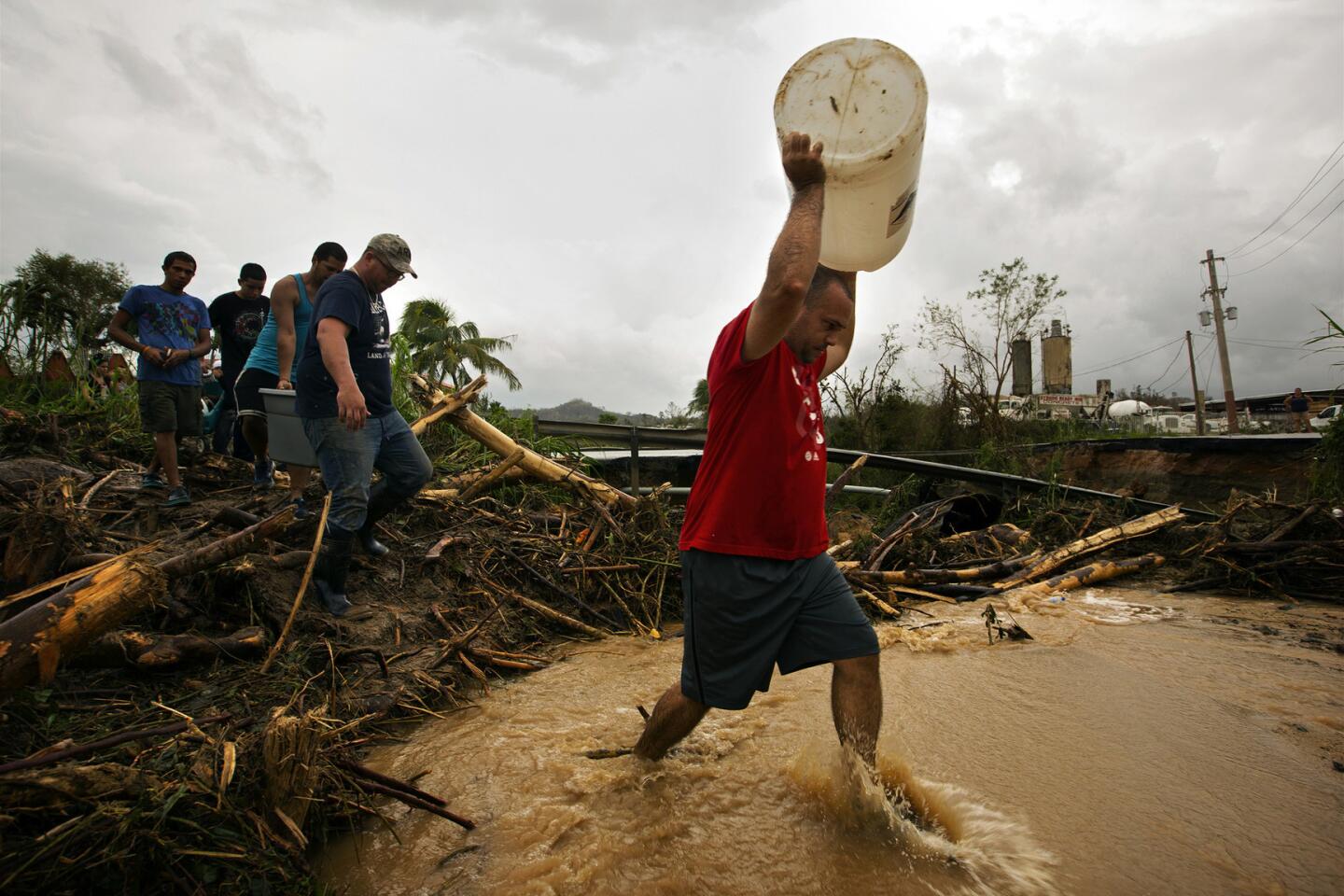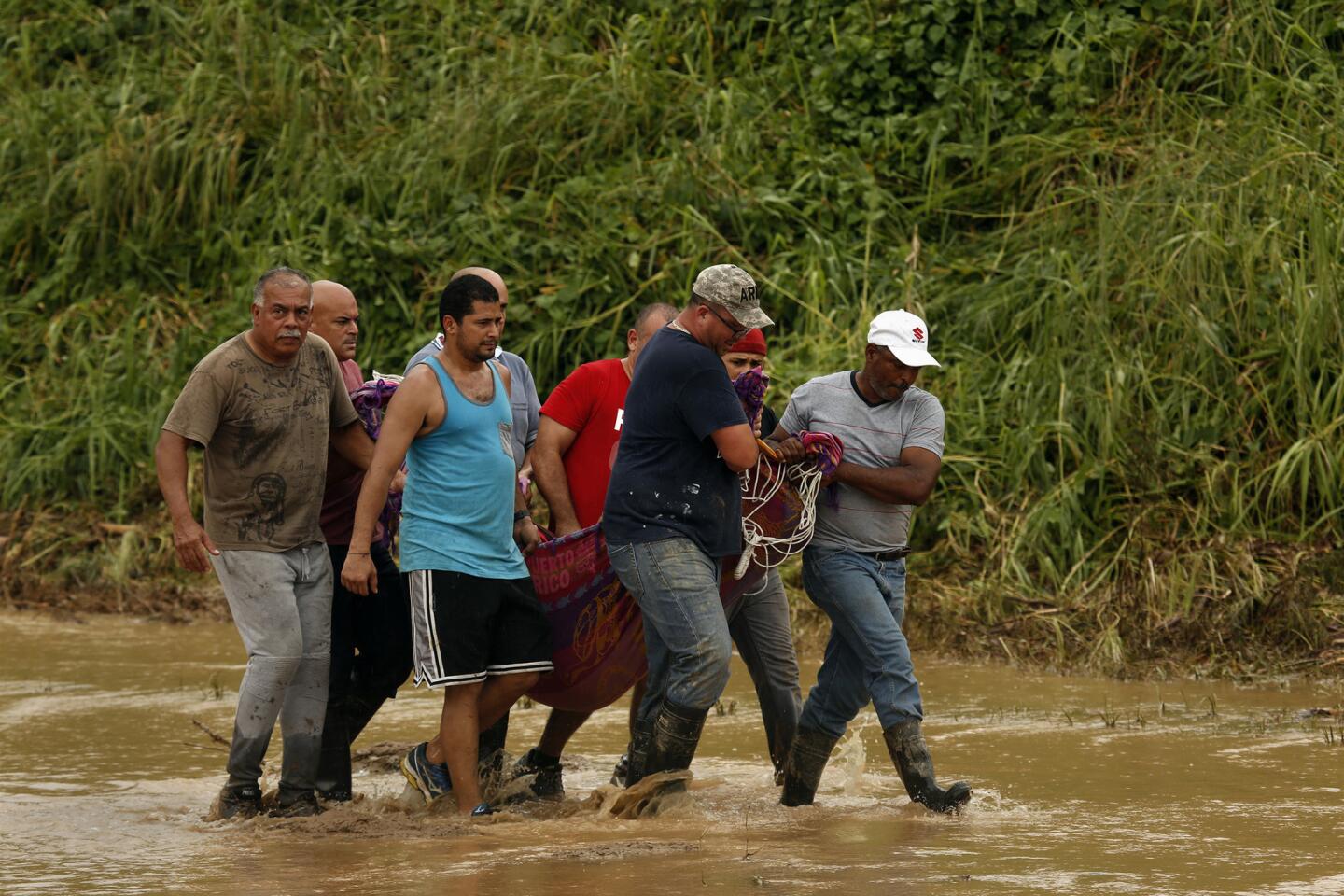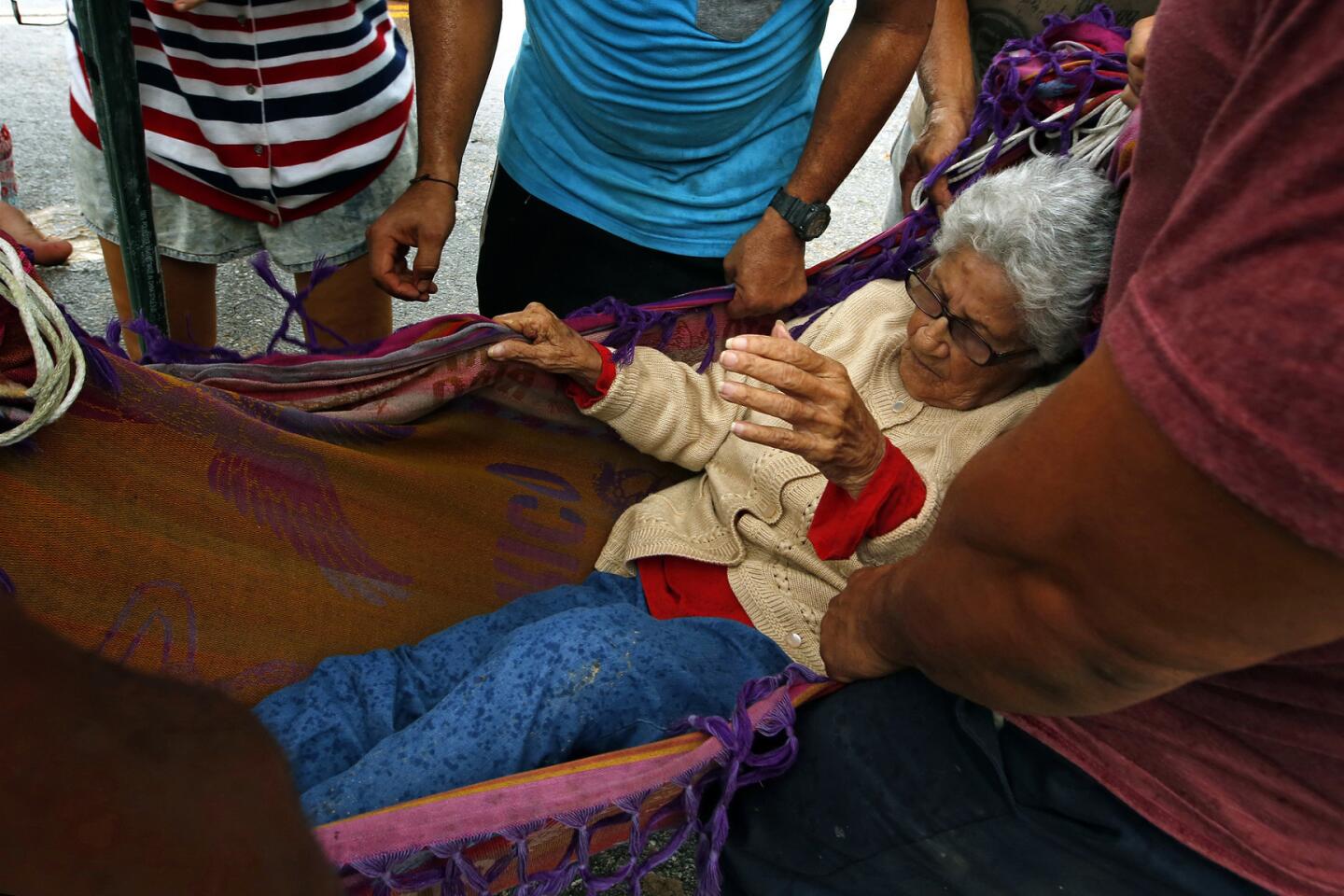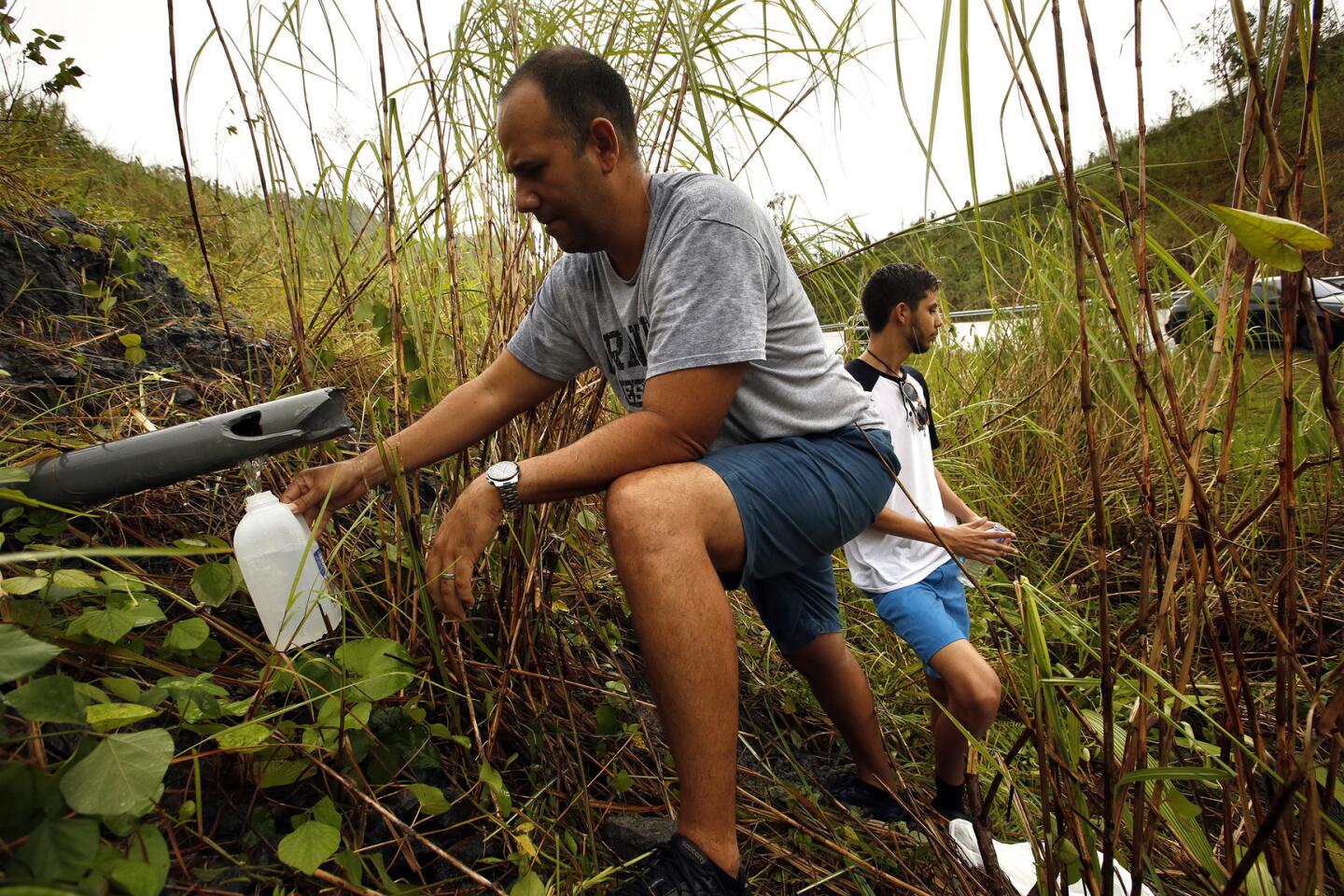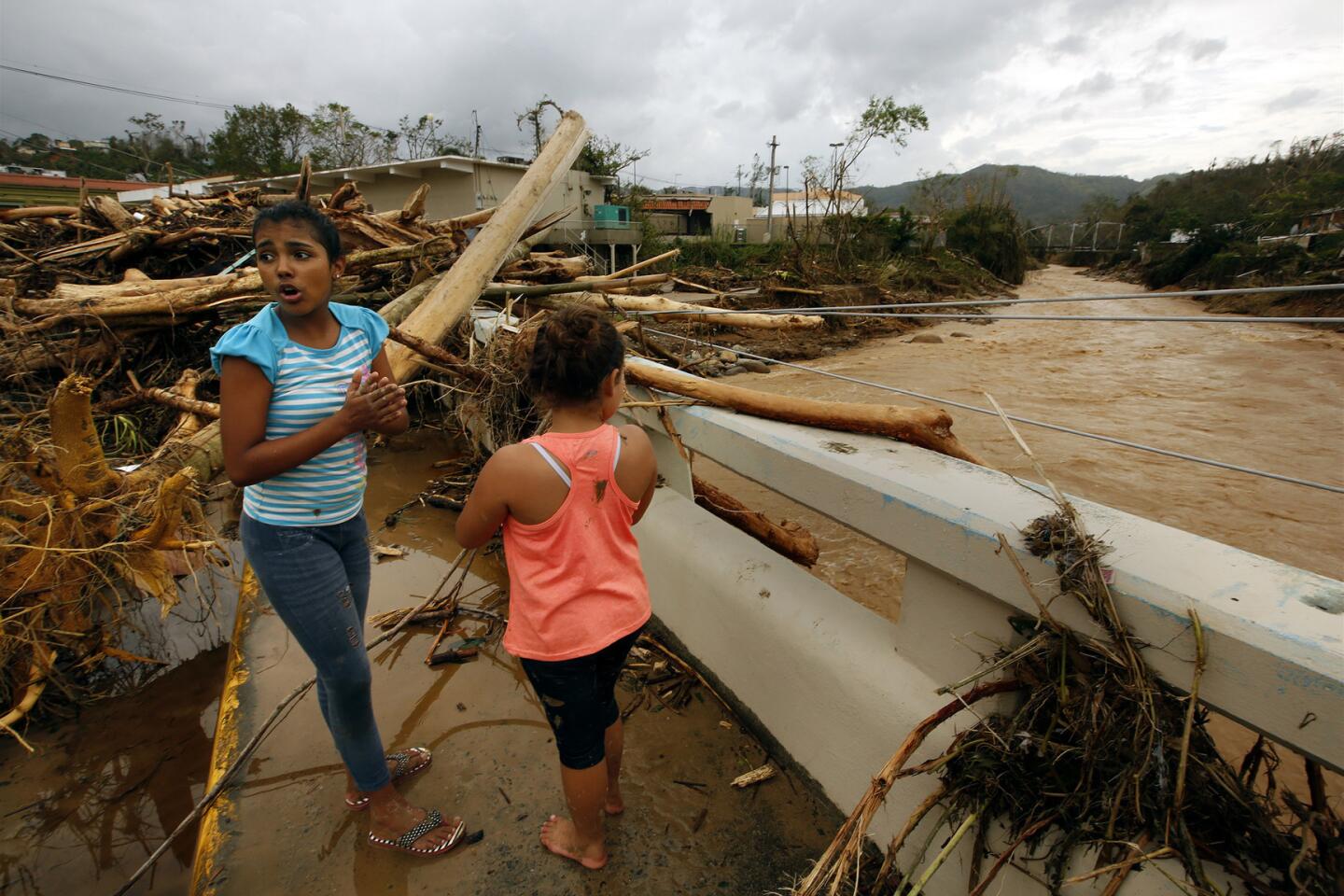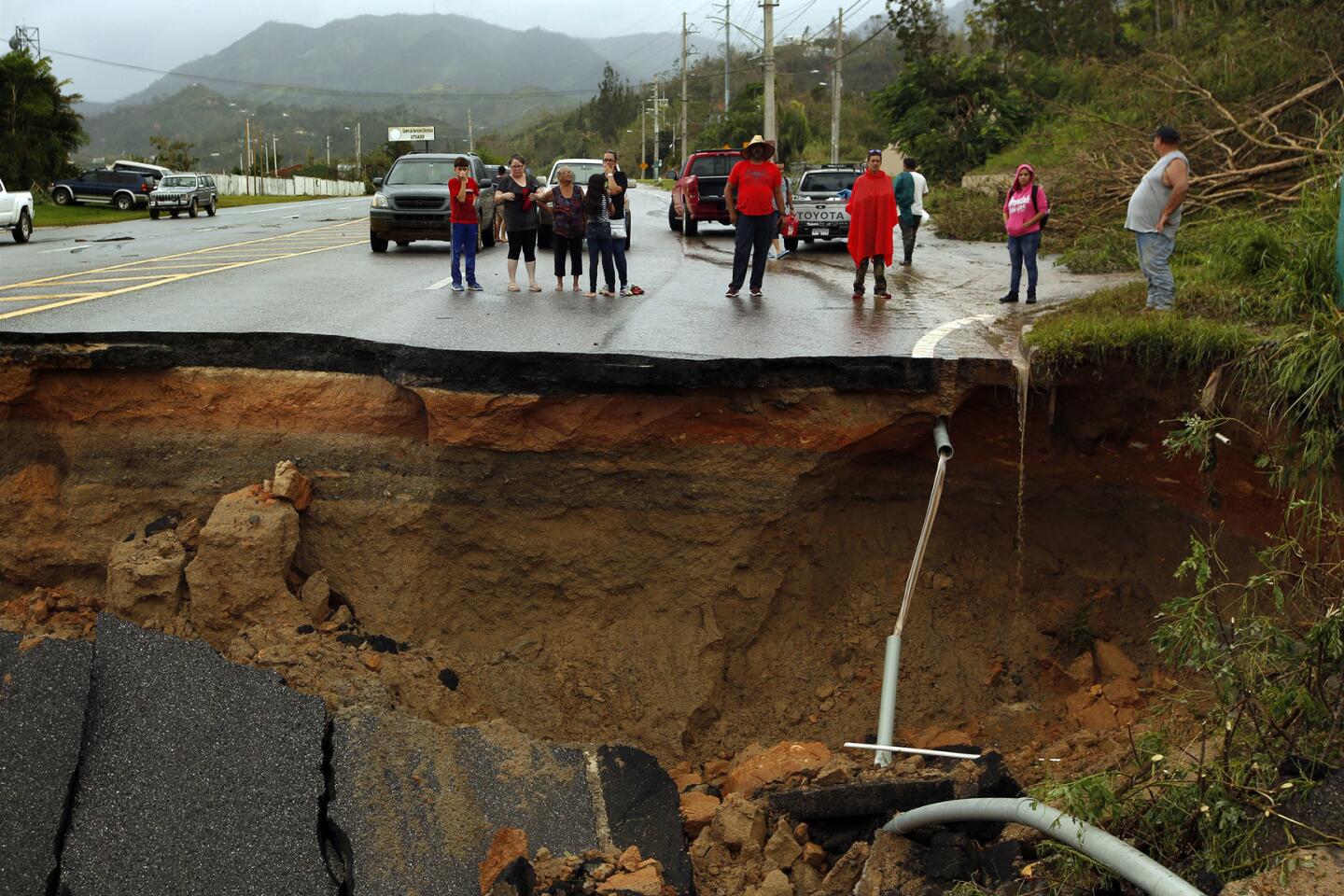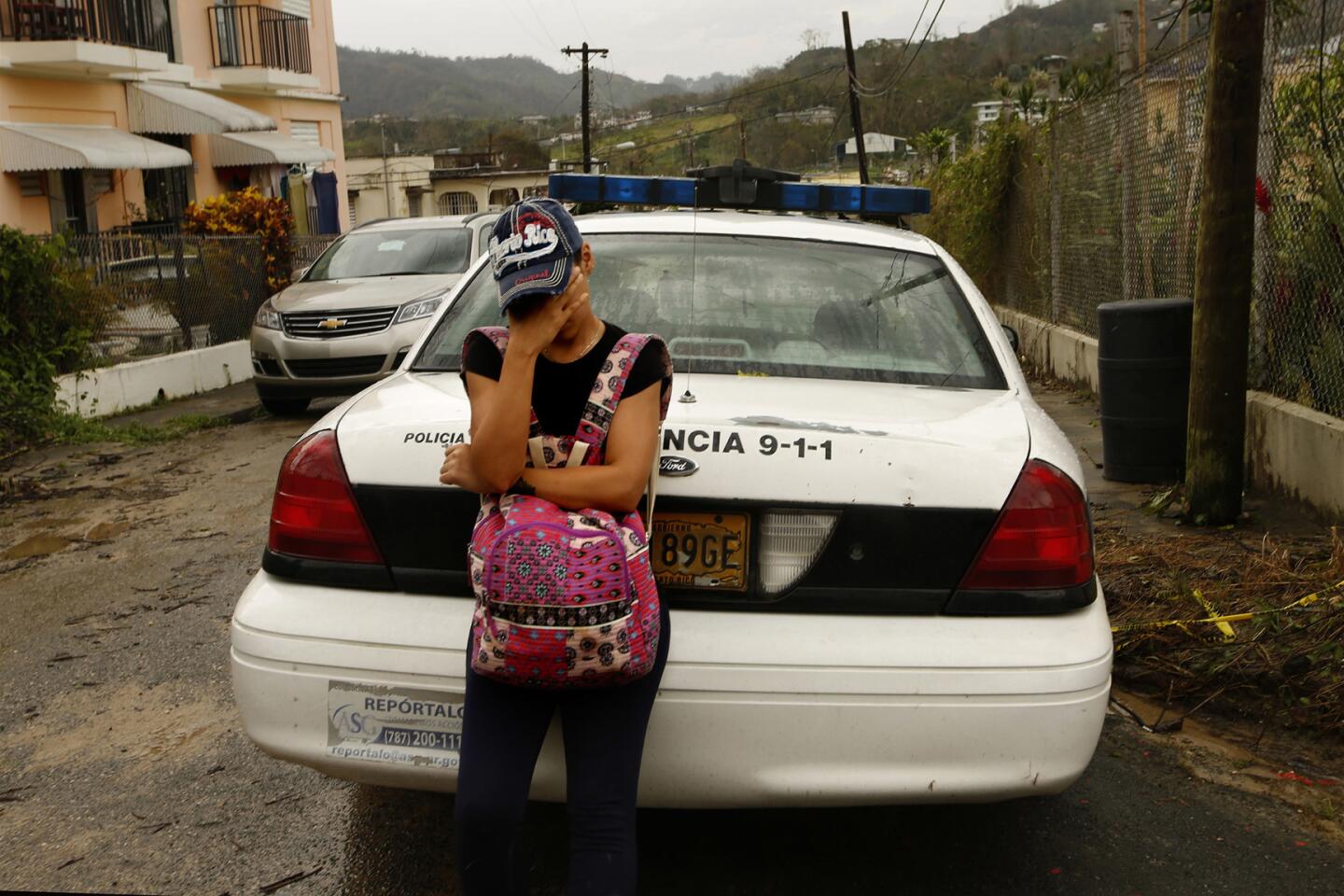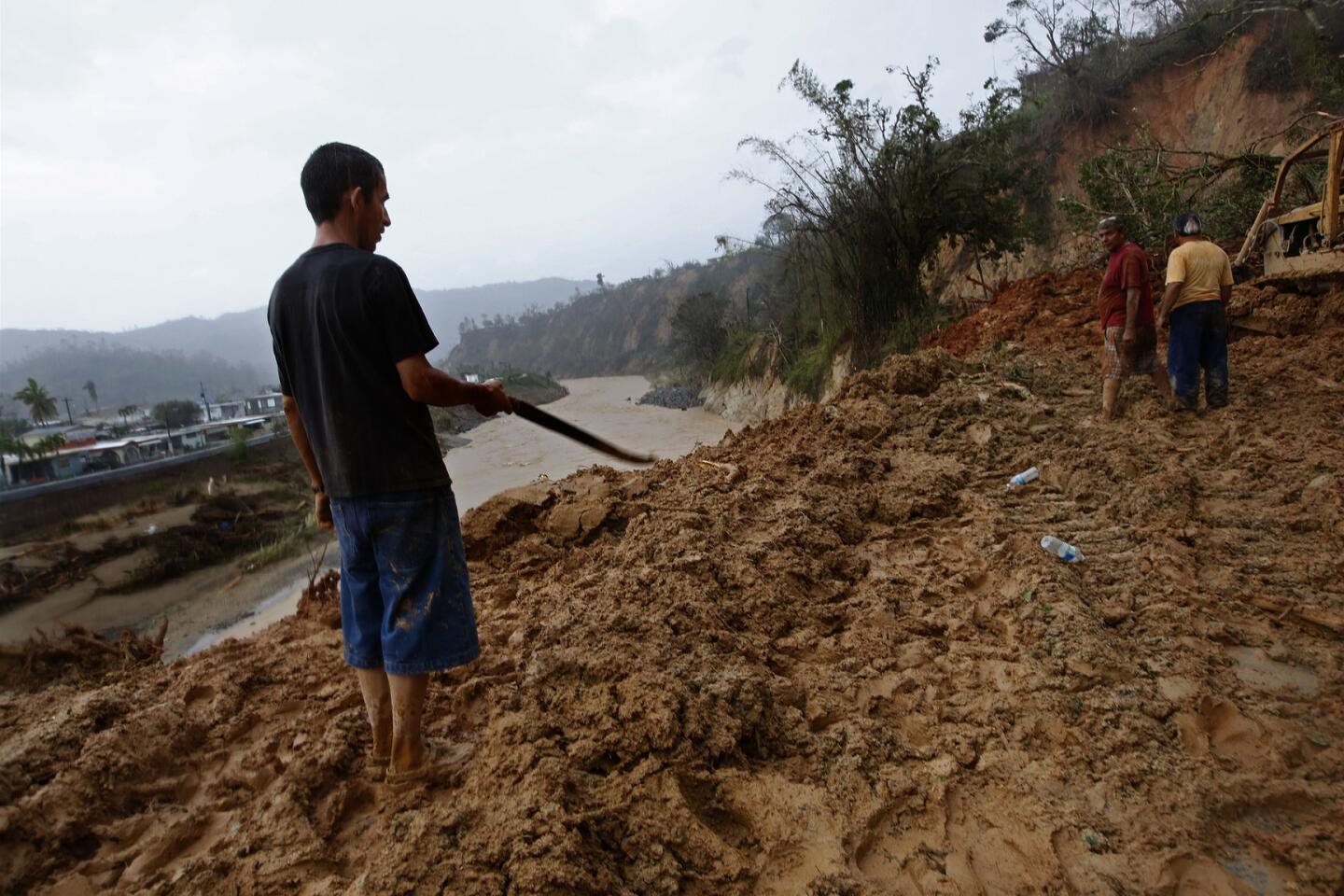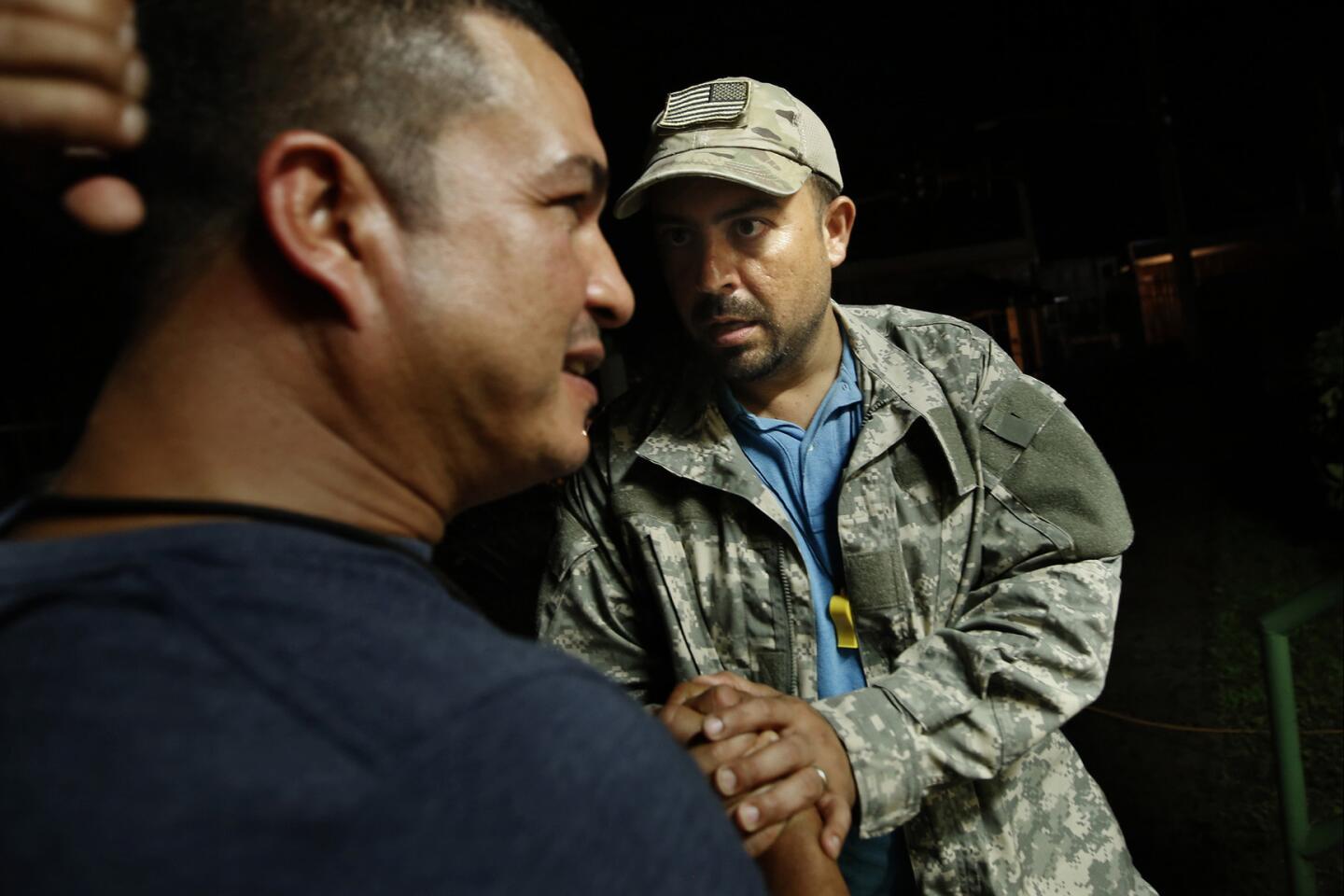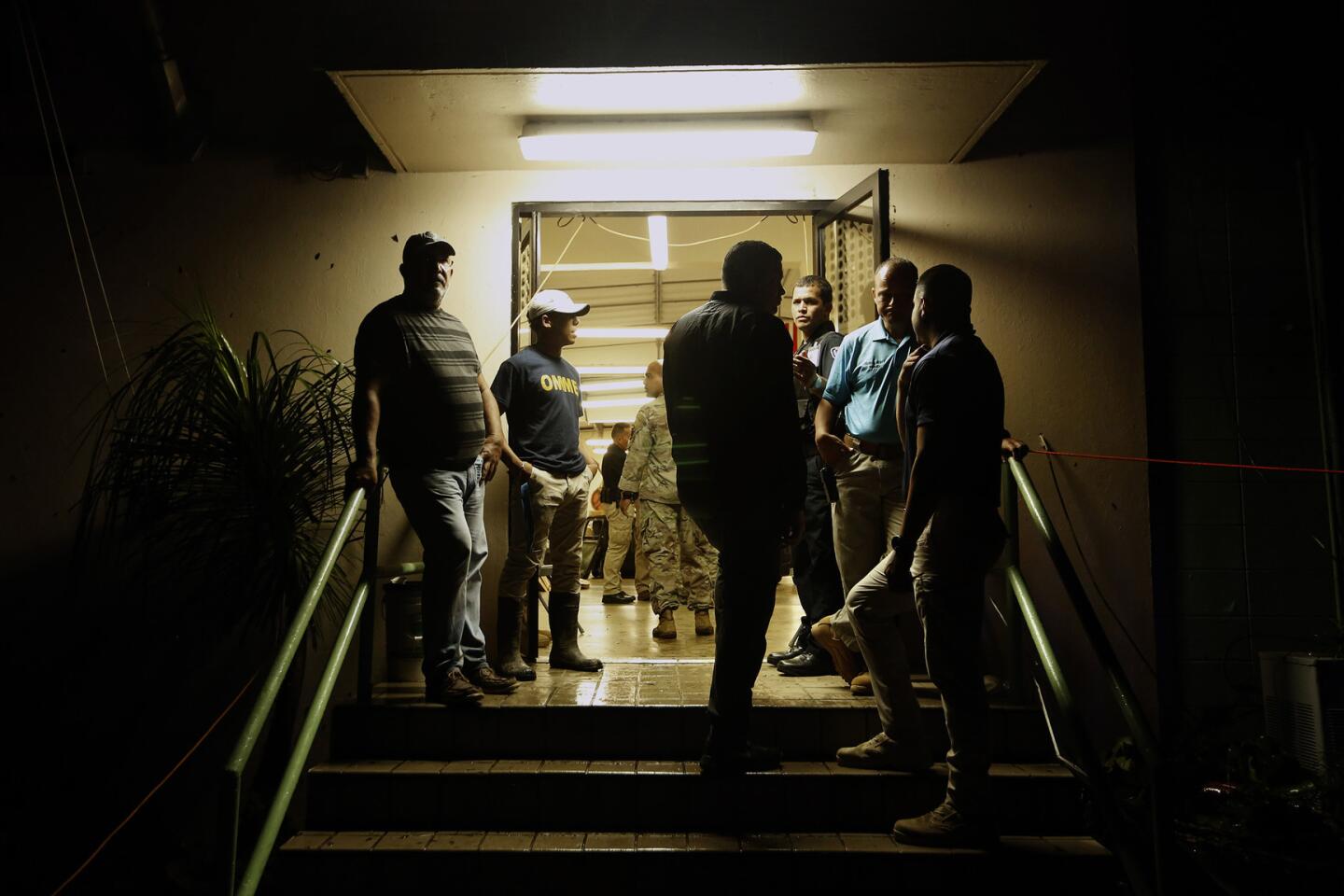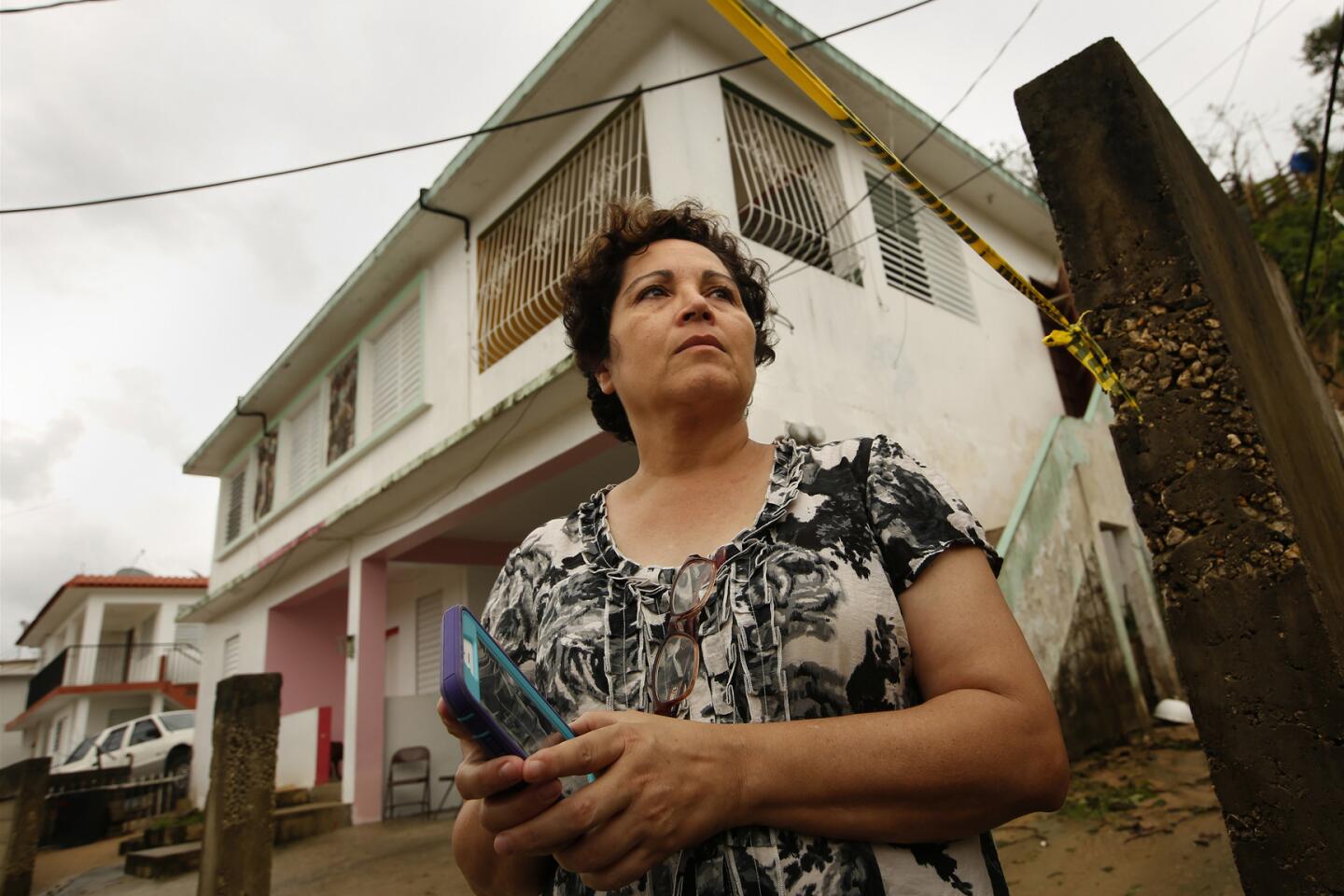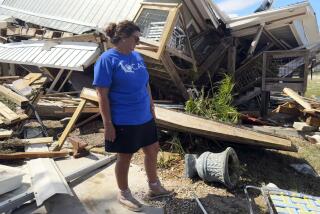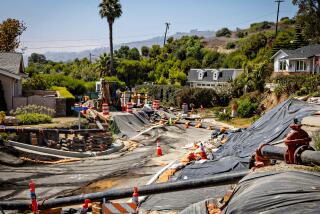In one Puerto Rico mountain town, a wall of mud came crashing down

In Utuado, Puerto Rico, there is no running water, so residents are collecting water from mountain springs. The main north-south road has completely washed out.
Reporting from UTUADO, Puerto Rico — Days after Hurricane Maria ravaged this mountain town, leaving whole neighborhoods without power, water and communications, the rain was still falling. A team of volunteers carried 89-year-old Delia Piñeda and her oxygen tank across first a cracked highway, then a river and a sea of mud to safety.
Among them was Edwin Vidal, a brawny retired U.S. Army Special Forces soldier. All day, he had been aiding neighbors from Salto Arriba, a hillside area of about 1,000 people, clearing roads with a chainsaw and ferrying disabled residents out on a makeshift stretcher.
When he found a utility worker who had broken his leg trying to fix electrical lines in the dense jungle, Vidal rescued him, too, hauling him out on a borrowed sofa.
“We help each other,” said Vidal, 61.
Across this island of 3.4 million, communities like Utuado, 65 miles southwest of the capital, were living on the edge this weekend, struggling to survive without even the most basic necessities. Already, at least 13 have died in the strongest hurricane Puerto Rico has seen in 85 years, including three elderly bedridden sisters killed by a landslide in Utuado.
About 70 people had to be evacuated from the town Friday night after the ground under their houses began to give way.
The Spanish colonial town, built in 1739, still sits at the heart of island’s interior mountain region known as La Cordillera Central, its name derived from the native Taino word otoao, “between mountains.”
Utuado is surrounded by dense forest of native ceiba, Asian teaks, and West Indian and Honduran mahogany where parrots roost. There are also massive dams on man-made lakes to the east and west, and it wasn’t clear how they had fared after the storm.
The landscape was what drew people to Utuado, where coffee haciendas were built by “black gold” in the 19th century, funding the island’s first electric light system run by a hydraulic power plant. Then the U.S. occupied the island in 1898, when plantations shifted to cultivating sugar cane, and Hurricane San Ciriaco arrived, damaging the coffee farms.
Utuado remains one of Puerto Rico’s top producers of coffee, along with fruits and livestock. The construction of Highway 10 in recent years opened a gateway to the region, cutting the three-hour drive to the capital in half.
But landslides this week damaged the highway and other major arteries, trapping residents in surrounding hills. The Vivi River was gushing, muddy and swollen with downed trees and other debris. The 49-bed Metropolitan Hospital of the Mountain was open only for emergencies, its four doctors and nine nurses working in shifts to care for about two dozen patients. Some had storm-related injuries, including a man who arrived Friday with a metal roof fragment embedded in his ankle.
Many elderly people with chronic medical needs couldn’t make it to the hospital due to blocked roads, and although there were emergency plans to care for them, without phone or internet service it was impossible to know their condition, said Jorge Salazar, who coordinates home care in the area.
At Utuado’s spare, waterlogged National Guard headquarters, officials attempted to survey damage and prevent further casualties. Among them was Mayor Ernesto Irizarry Salvá, dressed in borrowed fatigues, who evacuated with his 4-year-old daughter after his roof blew away and his family lost everything.
The former high school agriculture teacher described those who live in his town of 33,000 as humble, country people who unite in a crisis. He tried to reassure them, going on the AM radio station once it was restored Friday — one of only 70 towns in the area with radio access — to alert them about landslides and other risks. He walked across the entire town to ensure people were safe.
“I need all the people working hard to help restore communications,” he said. “We’re waiting, waiting for help.”
Residents were on edge, unsure where to shelter. Safe havens in town that had survived even Hurricane Irma earlier this month had been destroyed by Hurricane Maria, including the two-story house where a landslide buried the three elderly Gonzalez sisters.
The sisters lived across town on a flood-prone street, and had moved temporarily to the two-story concrete hillside home before the storm. They had done the same before Hurricane Irma, said brother Wilfredo Gonzalez.
“We thought we were protecting them. Nothing happened during Irma. Even the windows were fine. We thought it was secure,” Gonzalez said.
He said Irees Gonzalez Collazo, 74, had just returned from having an operation on her foot at a hospital. Sister Carmen Gonzalez Collazo, 73, had rheumatoid arthritis, and the third sister, Sara Gonzalez Collazo, 72, suffered from Parkinson’s disease. All three were single, close-knit, Pentecostal evangelicals who mainly ventured out to attend church services, he said.
Gonzalez said the family had to postpone the funeral procession and burial because his sisters’ bodies remained trapped in the house Friday, guarded by police who said they were waiting for heavy equipment to retrieve them.
“For all of Puerto Rico, it is the same,” he said as he stood outside his concrete ranch house Friday, next to the home of a disabled minister who had lost his roof. “There are lots of disasters.”
Neighbor Julio Roman was next door when the hillside behind their block gave way Wednesday morning, knocking out the sisters’ first-floor window and burying them where they lay on mattresses spread across the concrete floor.
“We heard a rumbling. That was when the mountain hit the back of the house,” he said.
They lived with a fourth sister, Hilda Gonzalez Collazo, 69, who was sleeping in a separate room near the front of the house and survived, screaming and fleeing to the street where neighbors found her in shock.
She had tried unsuccessfully to open her sisters’ door, and pleaded with Roman to go wake them. But when he entered the house and managed to wedge the bedroom door open, he found dirt piled nearly to the ceiling, and no sign of the sisters.
His wife tried to tell Hilda Gonzalez what had happened, but she was in shock.
“Maybe my sisters will wake up,” she said, and the couple explained that was impossible.
The area was cordoned off with yellow police tape Friday, and officers said it could be days before the bodies were removed. Roman and his family were staying until they ran out of water or were ordered to leave, he said, despite the risk that more of the muddy hillside would collapse.
“We feel somewhat secure. There’s not that many places you can go. I’m sure the shelters are packed,” he said.
Several neighbors were missing after the storm, with at least two presumed dead, officials said.
Dayanera Rodriguez came to Roman’s street looking for her missing cousin, Enid Jorenz, afraid she might have died in the mudslide. Her house was unscathed, but there was no sign of Jorenz, 35. Rodriguez left to continue searching.
Other neighbors used scarce gasoline to drive to a hillside spring where they believed the water was potable, carrying it back to their homes in plastic bottles and buckets. Those who lived in the surrounding mountains were forced to hike several hours to get water, food, batteries and whatever else they could scavenge from relatives and the few businesses that opened with generator power.
A line formed outside Walgreens, although it, too, had run out of water. Burger King opened briefly, along with a convenience store near the National Guard command post. But McDonald’s and most other businesses in town remained shuttered, dark, damp and powerless.
Among those trapped in the hills accessible only on foot was Maria Gonzalez Soto, 65, who had sheltered half a dozen neighbors during the storm. They were stuck without water or phone service, although they have a generator.
“We need electricity and water as soon as possible. At least we need the emergency services to be able to pass,” she said from her balcony overlooking the road, which was blocked by downed trees, power lines and mud.
Late Friday, Zahira Torres, 26, was making her way across the river with her husband and two sons, trying to avoid the broken road and make it home with supplies gathered from relatives in town.
A small crowd had gathered on the other side of the break of the road as darkness fell. Raul Gonzalez Salvá, 34, was among them. He had sheltered with his uncle in town during the storm, then hiked out Friday to check on his house in the hills. Four bridges had been washed out, one of them destroyed, he said. More than two dozen small landslides blocked the road. It took him four hours to reach his house, which it turned out had suffered only minor damage.
By the time he made it back, he was exhausted. It had begun to rain again, with flashes of lightning and bursts of thunder.
Gonzalez, who recruits for a local high school equivalency program, said it will take years to repair the highway. He wasn’t sure how long his community could live without it. One of his neighbors is holed up on the other side with 10 people, half of them children.
“We have been communicating mountain to mountain by yelling, ‘Hey, are you all right?’ ‘Yes, we’re here,’” Gonzalez said.
You can only yell so far. His grandmother had fled about 15 miles north to coastal Arecibo before the storm, where she was supposed to have a leg amputated. Gonzalez had no way to reach her or his mother, who accompanied her.
“We don’t even know if they’re alive,” he said.
A neighbor wearing a backpack full of supplies stopped to hug and laugh.
“We have to celebrate that we are living,” Gonzalez said after they parted, and he began to sob.
He stopped himself.
“If I get sad, I can’t work. We have to struggle to keep living,” he said.
Then he left on his long trek home.
To read the article in Spanish, click here
Twitter: @mollyhf
ALSO
After Hurricane Maria, ‘Puerto Rico isn’t going to be the same’
Failing dam in Puerto Rico triggers evacuations in Maria’s wake as death toll is expected to climb
Still reeling from Irma, U.S. Virgin Islanders scramble to evacuate ahead of another hurricane
More to Read
Sign up for Essential California
The most important California stories and recommendations in your inbox every morning.
You may occasionally receive promotional content from the Los Angeles Times.

